GPC Biotech Announces Granting of European Patent Related to Satraplatin for Treating Tumors Resistant or Refractory to Taxanes
GPC Biotech AG announced the granting of a European Patent (EP 1 720 540 B1) related to satraplatin, an oral platinum compound. The patent is entitled, "Satraplatin for treating resistant or refractory tumors" and covers certain uses of satraplatin related to the treatment of a cancer or tumor resistant or refractory to a taxane, including docetaxel (Taxotere®) and paclitaxel (Taxol®). The term of the patent extends up to 2025.
"Docetaxel is the standard of care for the first-line treatment of patients with hormone-refractory prostate cancer, or HRPC, and approximately half of the patients in the satraplatin Phase 3 SPARC trial in second-line HRPC were previously treated with docetaxel," said Bernd R. Seizinger, M.D., Ph.D., Chief Executive Officer. "With an active filing for satraplatin under review in Europe, we believe this patent will be of particular commercial importance, should satraplatin be approved for HRPC patients whose prior chemotherapy has failed."
The Company conducted the SPARC Phase 3 trial evaluating satraplatin in combination with prednisone in the second-line treatment of patients with HRPC. Approximately 50% of patients recruited into the study had progressive disease following prior treatment with docetaxel. The SPARC trial results showed a statistically significant improvement in progression-free survival in the overall intent-to-treat (ITT) population, as well as in the group of patients who had progressed after receiving docetaxel. While the overall survival results in the overall ITT population did not show a difference between the two treatment arms, there was a positive trend toward improved survival observed in those patients whose disease had progressed after receiving docetaxel, when adjusting for the three significant prognostic factors in the SPARC trial.
Organizations
Other news from the department research and development

Get the life science industry in your inbox
By submitting this form you agree that LUMITOS AG will send you the newsletter(s) selected above by email. Your data will not be passed on to third parties. Your data will be stored and processed in accordance with our data protection regulations. LUMITOS may contact you by email for the purpose of advertising or market and opinion surveys. You can revoke your consent at any time without giving reasons to LUMITOS AG, Ernst-Augustin-Str. 2, 12489 Berlin, Germany or by e-mail at revoke@lumitos.com with effect for the future. In addition, each email contains a link to unsubscribe from the corresponding newsletter.





















































